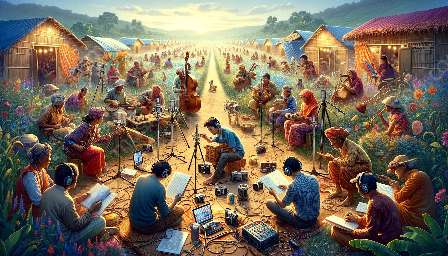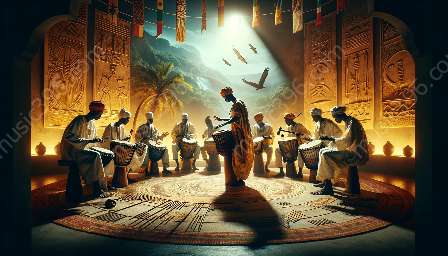Traditional music is an integral part of diverse cultures around the world, reflecting the rich heritage of communities and societies. In the field of ethnomusicology, the documentation and archiving of traditional music plays a crucial role in understanding and preserving these musical traditions. This topic cluster will delve into the significance of documenting and archiving traditional music, its relevance to fieldwork in ethnomusicology, and the ways in which it contributes to the study and preservation of musical diversity.
Importance of Documentation and Archiving
Documentation and archiving of traditional music are essential for preserving the cultural heritage of communities. Through recorded sound, video, photography, and written documentation, researchers and ethnomusicologists can capture the nuances of musical performances, rituals, and traditions, ensuring that they are not lost to time. This process not only provides valuable insights into the musical practices of different societies but also serves as a means of safeguarding these traditions for future generations.
Preservation of Cultural Diversity
Documentation and archiving of traditional music contribute to the preservation of cultural diversity. By recording and preserving the music of various communities, ethnomusicologists help prevent the erosion of unique musical traditions in the face of globalization and modernization. This is particularly relevant in today's interconnected world, where traditional music is at risk of being overshadowed by more mainstream and commercialized forms of entertainment.
Fieldwork in Ethnomusicology
Fieldwork in ethnomusicology often involves direct engagement with communities and their musical practices. Through fieldwork, researchers can document and archive traditional music in its original context, gaining a deeper understanding of the cultural and social significance of the music. This immersive approach allows for a more comprehensive documentation of traditional music, capturing not only the musical performances themselves but also the contexts in which they occur, such as rituals, celebrations, and everyday life.
Collaborative Ethnomusicological Research
Documentation and archiving of traditional music frequently involve collaborative research efforts between ethnomusicologists, local communities, and cultural institutions. By facilitating partnerships with community members, scholars can ensure that the documentation process is respectful, ethical, and inclusive. This collaborative approach also allows for the exchange of knowledge and skills, empowering communities to actively participate in the preservation and documentation of their musical heritage.
Technological Innovations and Ethnomusicological Archives
Advancements in technology have transformed the way traditional music is documented and archived. Digital audio and video recordings, along with online databases and archives, have greatly expanded the accessibility of traditional music materials. Ethnomusicologists can now create comprehensive multimedia archives that not only store musical recordings but also contextual information, translations, and scholarly analyses, making traditional music more accessible for scholarly research and educational purposes.
Challenges and Ethical Considerations
While the documentation and archiving of traditional music offer numerous benefits, they also present challenges and ethical considerations. Researchers must navigate issues of consent, intellectual property rights, and cultural sensitivity when documenting traditional music. Ethnomusicologists must approach the documentation process with mindfulness and respect for the communities whose music they are preserving, ensuring that their work aligns with ethical standards and does not exploit or misrepresent the cultural heritage of the communities involved.
Education and Outreach
Documented traditional music serves as a valuable resource for educational and outreach initiatives. By making these recordings and archives accessible to a wider audience, ethnomusicologists can facilitate cross-cultural understanding and appreciation. Furthermore, using traditional music as a tool for education and outreach can help raise awareness about the importance of preserving cultural heritage and promoting respect for diverse musical traditions.
Conclusion
The documentation and archiving of traditional music in the field of ethnomusicology are crucial for understanding, preserving, and promoting the musical diversity found in communities around the world. Through collaborative and ethical approaches, researchers can create comprehensive archives that serve as valuable resources for scholarly research, education, and the safeguarding of cultural heritage. By recognizing the significance of traditional music and engaging in responsible documentation and archiving practices, ethnomusicologists contribute to the preservation of diverse musical cultures for generations to come.



































